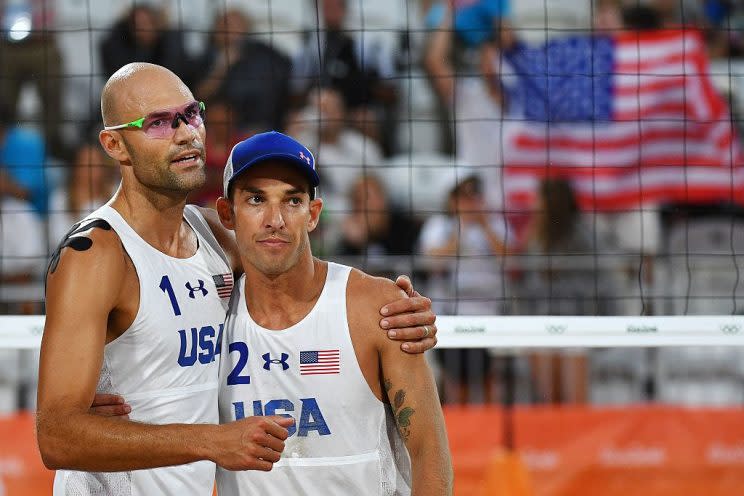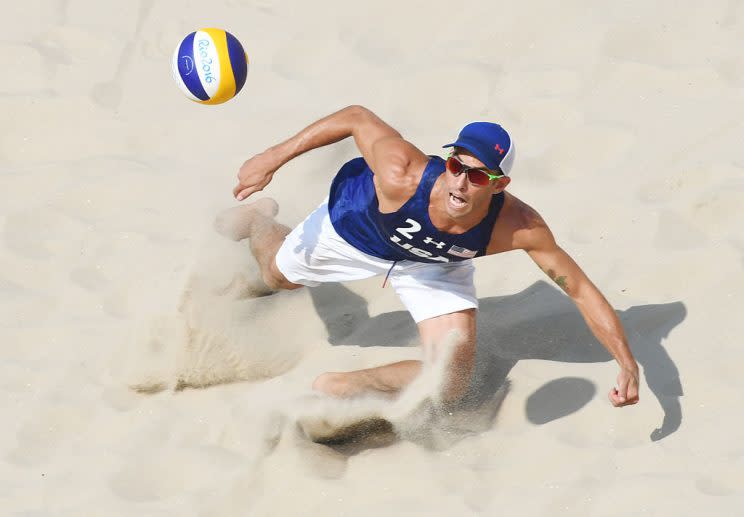Two old friends, a risky partnership and Olympic beach volleyball

Medal count | Olympic schedule | Olympic news
RIO DE JANEIRO – It started with an email between old friends.
Phil Dalhausser and Nick Lucena have known each other since they were 19, growing up in different Floridian cities but eventually bonding on the state’s amateur beach volleyball circuit. They were partners in pro beach volleyball for over five years, until Dalhausser was given an offer he couldn’t refuse: Partnering up with Todd Rogers, arguably the best defensive player in American beach volleyball at the time.
Dalhausser and Rogers would go on to win Olympic gold in Beijing. But London was a different story, as the duo was upset in the Round of 16 by Italy, amid chemistry issues between them. Rogers would retire before the Rio Olympics. Dalhausser wasn’t sure what his status was, due to a prolonged injury rehab that kept him out of qualifying tournaments and without a partner.
[Related: Dalhausser, Lucena set Olympic record in marathon win]
So Lucena sent him an email.
“For 10 years, I was trying to play with Phil again. In my mind, he was the best blocker in the world. We had chemistry. But I never asked him once to play together during those 10 years, until last year,” he said.
Dalhausser opened the email, and read the proposal: Lucena would leave his current partner Theo Brunner to play with his old friend Dalhausser, in an attempt to medal in Rio.
Dalhausser’s immediate reaction? Trying to talk him out of it.
“I told him he was taking a huge risk. I’m not 100 percent. You’re basically throwing an Olympic spot away,” he said. “He took a huge gamble on me, if you ask my opinion. His old partner and him were in a pretty good spot to qualify.”
But they decided to forge a partnership, and began an uphill climb. Last August, they were ranked 24th in the ASICS World Series of Beach Volleyball. As they enter the elimination rounds in the Rio 2016 Olympics on Saturday, they’re ranked No. 3 in the tournament.
“Nick and I are playing with the house’s money. We started a year ago, playing together. We started qualifying while teams had the whole summer to play together last year, we started at the end of the summer and missed all the good tournaments, because I was hurt,” said Dalhausser. “We shouldn’t really be here, but we caught fire at the end of last year, continued into this year, and slipped into the third seed, somehow.”

For Lucena, the journey back to being Dalhausser’s partner took him through stretches where he contemplated quitting the sport.
Starting out with Dalhausser as pro tour novices, he said beach volleyball was originally just a way for a former soccer player to find some direction after graduating from Florida State.
“Beach volleyball’s really not the most lucrative sport. You have to be one of the top three or four teams to even make money. And we didn’t know what we were doing. I remember the first time we qualified, we were afraid to go into the players’ tent,” he said.
When Dalhausser left to team with Rogers, Lucena played on. But as the Rio Games approached, so did a day of reckoning about his future.
He asked Team USA teammate Jacob Gibb to form a partnership, but he opted to play with Casey Patterson. (Their team didn’t make it out of pool play in Rio.) Lucena considered leaving the beach for the classroom, returning to Florida State to get his masters.
But the potential to play with Dalhausser again continued to be a driving force in keeping him in the game. “I really didn’t want to get a real job. So let’s do this as long as we can,” he said. “I worked hard to remain as one of the better defenders, and find a way to play with him again. It worked out.”
[Related: USA beach volleyball duo’s Olympic run ends in controversy]
Dalhausser and Lucena face Robin Seidl and Alexander Huber from Austria at midnight on Saturday night in the Round of 16. That duo went 2-1 in pool play, including a straight sets win over Gibb and Patterson.
It’s also the part of the tournament where Dalhausser’s team was ousted last Olympics.
“This is my redemption,” he said. “[London 2012] was a weird year for Todd and I. We had a weird dynamic. It wasn’t clicking. So what I learned from 2012 is that I’m not going to let it happen this year, and Nick and I are going to stay on the same page.”
Just another reason why an old friend can sometimes make for the right partner.
—
Greg Wyshynski is a writer for Yahoo Sports. Contact him at puckdaddyblog@yahoo.com or find him on Twitter. His book, TAKE YOUR EYE OFF THE PUCK, is available on Amazon and wherever books are sold.
Listen to Yahoo Sports’ Greg Wyshynski podcast from Rio on GRANDSTANDING, featuring U.S. swimming legend Summer Sanders on Michael Phelps, IOC doping and Donald Trump:



